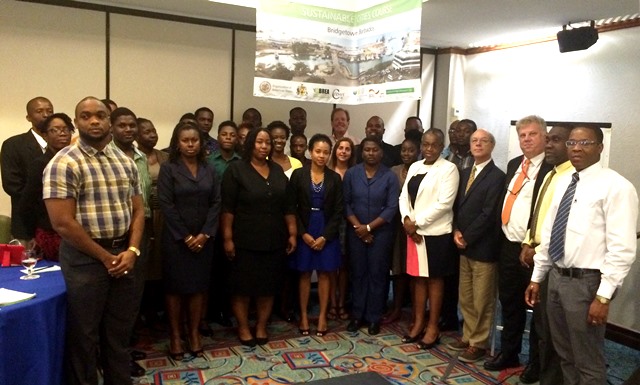Sustainable Communities in Central America and the Caribbean Sustainable Cities Course, 3rd Edition
Sustainable Communities in Central America and the Caribbean Sustainable Cities Course, 3rd Edition
Date: 10-14 August, 2015.
Venue: Bridgetown, Barbados
The cities of the Americas are experiencing dramatic and accelerating changes. Significant demographic variations and technological advances are having an increasingly powerful impact on how people live in the region. According to recent studies, Latin America and the Caribbean have the highest rate of urbanization in the developing world. Furthermore, the proportion of the regions’ population living in cities has doubled from 41% to 80% in the last 60 years. Many former colonial Caribbean cities have outgrown their initial physical and economic capacity and require planning interventions that will allow for the useful retention of the historic urban fabric, while promoting new opportunities for local economic development. Cities are centers of economic growth and cultural exchange. An understanding of their built and cultural heritage is important in order to catalyze economic development.
Coastal communities and cities face a specific set of challenges related not only to high urbanization, but also to climate change and tourism centered economies. Historic Bridgetown and its Garrison was inscribed on the UNESCO World Heritage list in 2011. According to UNESCO, “With its serpentine urban lay-out the property testifies to a different approach to colonial town-planning compared to the Spanish and Dutch colonial cities of the region which were built along a grid plan.” Metropolitan Bridgetown has a population of 110,000, and Bridgetown is the capital of Barbados, which has a population of 283,000. The country’s 2013 GDP per capita was $25,372, making it one of the wealthiest countries in the Caribbean. As an extremely tourism-dependent economy whose visitors are drawn to the beaches rather than urban heritage, Bridgetown represents a unique opportunity to leverage its recent designation as both a tourism draw and a tool for celebrating local heritage and culture.

With the objective of highlighting advancements in sustainable cities, the Organization of American States, the Barbados Renewable Energy Association (BREA) and the Government of Barbados have convened a group of urban and social transformation professionals. The Sustainable Cities course provides an integral overview of the different aspects that contribute to building sustainable communities targeting different topics relevant to the First Summit on Sustainable Development in the Americas held in Santa Cruz de la Sierra in December 1996. In this context, section II.3 Sustainable Cities and Communities recognized:
- The incorporation of the poorest and most disadvantaged sectors of the population into the productive process by, inter alia, creating jobs through public and private investment and expanding and enhancing access to credit and to environmentally sound technologies;
- Growth in job creation in small and micro-enterprises by simplifying paperwork, bureaucracy, and operations that affect them and by promoting the economic competitiveness and environmental efficiency of these production units in urban as well as rural areas;
- Narrowing of the housing unit gap and expansion of basic infrastructure services through a comprehensive approach to the problem of rapid urban growth, including the use of clean, safe technologies;
- Promotion of the quality of life in cities and communities, taking into account their spatial, economic, social, and environmental circumstances; and
- Assurance of the most efficient and least polluting industrial and transportation practices so as to reduce adverse environmental impact and promote sustainable development in cities and communities.

Course Objective:
Provide theoretical and practical knowledge on the different elements that contribute to the development of sustainable cities to government officials and members of civil society involved in planning processes and urban development
Specific Objectives:
- Provide state of the art knowledge on the set of systems involved in the urban setting combining social and physical science approaches.
- Analyze case studies and identify best practices
- Provide a first hand experience regarding the benefits of green infrastructure, energy efficiency demonstration projects and sustainable transport systems through field visits.
Course Methodology:
The course will include theoretical presentations that combine the professor’s input with student participation. Case studies will be presented and discussed in order to develop practical skills regarding the issues discussed. This website will provide background readings and material on each module so that students can prepare in order to enhance learning and assimilation of the program content. The course will combine theory with practical exercises in which the students will experience the content of each module applied to real life situations through lectures, readings, field trips group exercises and discussion. The course will close with a set of field trips in which students will be able to come in contact with the operations and functioning of green infrastructure, energy efficiency projects and sustainable transport examples in Bridgetown.
Course Content
|


For further information on this course please contact Richard Huber at rhuber@oas.org.

